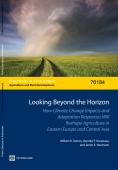This report was commissioned by UNEP in response to the multiple global crises of 2008 – fuel, food and financial. The report proposes a mix of policy actions that would stimulate economic recovery and at the same time improve the sustainability of the world economy. The Global Green New Deal (GGND) calls on governments to allocate a significant share of stimulus funding to green sectors and sets out three objectives: (i) economic recovery; (ii) poverty eradication; and (iii) reduced carbon emissions and ecosystem degradation; and proposed a framework for green stimulus programs as well as supportive domestic and international policies.
National actions proposed for the GGND include:
Launched at Global Roundtable on 19-20 October 2011 in Washington DC, the UNEP FI Guide to Banking and Sustainability provides a clause-by-clause explanation of the UNEP Statement of Commitment by Financial Institutions on Sustainable Development, seeking both to shed further light on the meaning of individual clauses, and to provide guidance on how banking institutions might seek to apply them in their day-to-day operations. The Guide further provides illustrations of current practice within UNEP FI Signatory banks, and references to key resources.
The tool results from consultations with a variety of UNEP FI members from the banking sector, who have identified a range of uses to the Guide, from Board level to operations:

The publication presents the results of an evaluation that aimed to seek lessons and recommendations in relation to the low‐carbon development of the World Bank Group’s portfolio in energy, forestry and transport. The evaluation sought to establish how the WBG’s investments in low‐carbon growth opportunities can have the greatest impact, both for development and for greenhouse gas mitigation.
The three key findings emerging from the evaluation are that:
(1) The WBG can achieve great impact by providing advice and support for favourable policies such as removal of energy subsidies and other biases against renewables and energy efficiency,
(2) Act more like a venture capitalist, by supporting the transfer and adaptation to local conditions of existing technologies, policies and financial practices, and
(3) By focusing on high‐impact sectors and instruments, such as energy‐efficiency and forestry interventions.
The efficiency and productivity of Colombia's urban system will be a key determinant in the ability of the country to transition from a middle income to a higher-income economy. Colombia, as with most Latin American countries, has experienced positive growth rates in the past few years, mitigating the potential adverse impacts of the global financial crisis. High commodity prices as well as improvements in macroeconomic and financial management, diversification of trading partners (particularly through stronger links with China), and the safe integration into international financial markets are the main drivers for recent success in Colombia and the Latin American region (World Bank 2011).
The document presents a series of climate change-related projects that the International Finance Cooperation (IFC) has supported from all around the world. It also contains a series of tools for green investors, including:
This report summarizes the results of a recent review of the emerging experience with the design and implementation of policy instruments to promote the development of renewable energy (RE) in a sample of six representative developing countries and transition economies ('developing countries') (World Bank 2010). The review focused mainly on price- and quantity-setting policies, but it also covered fiscal and financial incentives, as well as relevant market facilitation measures. The lessons learned were taken from the rapidly growing literature and reports that analyze and discuss RE policy instruments in the context of different types of power market structures. The analysis considered all types of grid-connected RE options except large hydropower: wind (on-shore and off-shore), solar (photovoltaic and concentrated solar power), small hydropower (SHP) (with capacities below 30 megawatts), biomass, bioelectricity (cogeneration), landfill gas, and geothermal. The six countries selected for the review included Brazil, India, Indonesia, Nicaragua, Sri Lanka, and Turkey.
Technology development and its rapid diffusion are considered crucial for tackling the climate change challenge. In particular, enhancing technology transfer towards developing countries has been an integral part of the global climate change regime since the inception of the United Nations Framework Convention on Climate Change (UNFCCC). The Bali Action Plan reaffirmed its centrality, and the Copenhagen Accord calls among other things for the establishment of a mechanism to accelerate technology development and transfer.
The role of intellectual property rights (IPRs) in the transfer of climate change technologies has emerged as a particularly contentious issue in the past two years. Against this background, the United Nations Environment Programme (UNEP), the European Patent Office (EPO) and the International Centre for Trade and Sustainable Development (ICTSD) joined forces to undertake an empirical study on the role of patents in the transfer of clean energy technologies (CETs).
